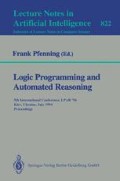Abstract
In this paper, we examine the effect of antiprenexing on the proof length if resolution deduction concepts are applied. Roughly speaking, our version of antiprenexing moves ∀-quantifiers downward in the formula tree whereas ∃-quantifiers are moved upward. We show that two different Skolemization techniques result in two clause sets with rather different resolution refutations. The lower bounds on the length of both refutations differ exponentially. Furthermore, we demonstrate that both techniques can be improved if antiprenexing is applied before Skolemization. Finally, we examine the influence of antiprenexing if extended resolution deduction concepts are used.
Preview
Unable to display preview. Download preview PDF.
References
P. B. Andrews. Theorem Proving via General Matings. Journal of the Association for Computing Machinery, 28, No.2:193–214, 1981.
M. Baaz and A. Leitsch. Complexity of Resolution Proofs and Function Introduc-tion. Annals of Pure and Applied Logic, 57:181–215, 1992.
M. Baaz and A. Leitsch. On Skolemization and Proof Complexity. Fundamenta Informaticae, 1994.
W. Bibel. An Approach to a Systematic Theorem Proving Procedure in First-Order Logic. Computing, 12:43–55, 1974.
W. Bibel. Automated Theorem Proving. Vieweg, Braunschweig, second edition, 1987.
E. Eder. Relative Complexities of First Order Calculi. Vieweg, Braunschweig, 1992.
U. Egly. Shortening Proofs by Quantifier Introduction. In A. Voronkov, editor, Proceedings of the International Conference on Logic Programming and Automated Reasoning, pages 148–159. Springer Verlag, 1992.
U. Egly. On Different Concepts of Function Introduction. In G. Gottlob, A. Leitsch, and D. Mundici, editors, Proceedings of the Kurt Gödel Colloquium, pages 172–183. Springer Verlag, 1993.
U. Egly. Function Introduction and the Complexity of Proofs. PhD thesis, TH Darmstadt, Alexanderstr. 10, D-64283 Darmstadt, 1994. Forthcoming.
R. Hähnle and P. H. Schmitt. The Liberalized δ-Rule in Free Variable Semantic Tableaux. Journal of Automated Reasoning. To appear.
H. R. Lewis. Renaming a Set of Clauses as a Horn Set. Journal of the ACM, 25(1):134–135, 1978.
D. W. Loveland. Automated Theorem Proving: A Logical Basis, volume 6 of Fun-damental Studies in Computer Science. North-Holland Publishing Company, Amsterdam, New York, Oxford, 1978.
D. A. Plaisted and S. Greenbaum. A Structure-Preserving Clause Form Transla-tion. Journal of Symbolic Computation, 2:293–304, 1986.
R. Statman. Lower Bounds on Herbrand's Theorem. In Proc. AMS 75, pages 104–107, 1979.
Author information
Authors and Affiliations
Editor information
Rights and permissions
Copyright information
© 1994 Springer-Verlag Berlin Heidelberg
About this paper
Cite this paper
Egly, U. (1994). On the value of antiprenexing. In: Pfenning, F. (eds) Logic Programming and Automated Reasoning. LPAR 1994. Lecture Notes in Computer Science, vol 822. Springer, Berlin, Heidelberg. https://doi.org/10.1007/3-540-58216-9_30
Download citation
DOI: https://doi.org/10.1007/3-540-58216-9_30
Published:
Publisher Name: Springer, Berlin, Heidelberg
Print ISBN: 978-3-540-58216-8
Online ISBN: 978-3-540-48573-5
eBook Packages: Springer Book Archive

